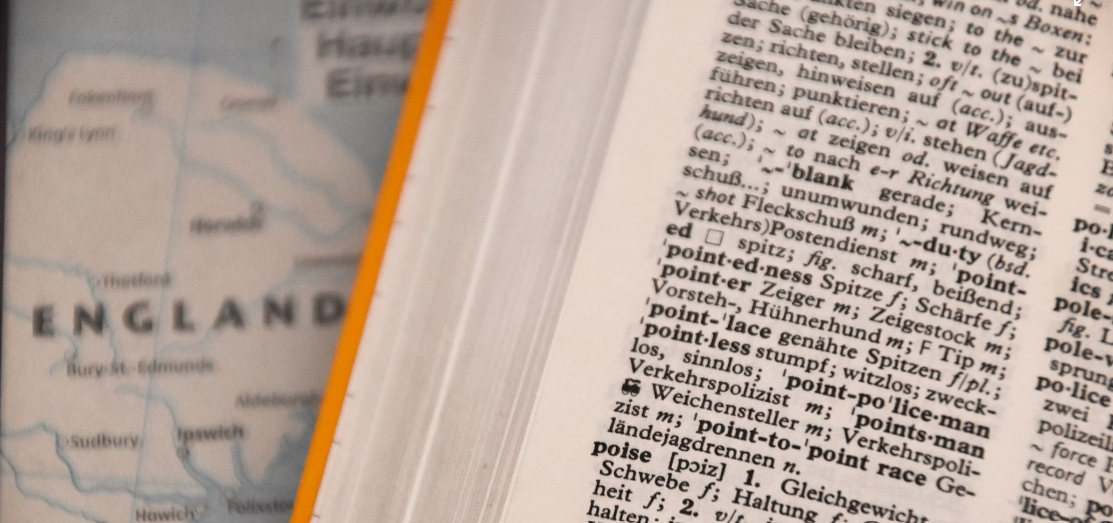English, the lingua franca of the world, is spoken by 1.5 billion people worldwide, making it the world’s most spoken language. 67 countries worldwide have it as an official language alongside languages native to the area. The language allows people around the world to communicate with each other, even people from places as different as Belize and Malaysia. While the language benefits many, it’s important to remember its legacy and history.
English originates from the British Isles in Europe, but as of 2021, the UK ranks sixth in the number of speakers, and India is the country with the most English speakers. That is due to its large population but also because it was under British colonialism for several decades. Most of the world was also at one point under British rule, everywhere from Malaysia, Palestine, Cyprus, Kenya, Botswana, Nigeria, Guyana, Belize, and many more. British rule was also very recent; India and Palestine are the first countries mentioned here to gain independence in 1947, and the others followed throughout the decades. Many of those countries suffered during British rule and still to this day. In the modern day, English is spoken alongside languages native to the region. That brings the question, how does English as a lingua franca impact other languages? How is English seen in the Global South? How is English a legacy of British colonialism?
To start, it’s important to go back to the start of British colonization in the 1600s. Spain and Portugal had already begun colonizing the American continent, and now, Great Britain joined. At the time, it was also making colonies in Africa and Asia. In the early 20th century, Great Britain was at its greatest extent, ruling a large part of the world. It eventually went to Asia and Africa, colonizing and occupying those areas. It made colonies and imposed the English language on the people already there.
In 1776, the US became the first colony to get independence. But, there was a genocide of indigenous people, causing many languages to be erased, something that was still ongoing. Manifest density displaced many indigenous people and led to the forced assimilation of them, including the loss of language and culture. Similar things also happened to indigenous languages in Canada and Mexico. The population of indigenous people in the western hemisphere had gone from multi-millions to now less than 300,000; 66% of languages have become extinct, and many of them that survived are endangered to this day. English is a colonial language bought by British colonists as they colonized indigenous peoples, so when the US was created, it was the same. Due to forced assimilation policies, many Indigenous languages were erased in favor of English.
India is also another place that the UK colonized, and it faced many famines and was exploited as a result. India is home to many languages. Hindi is the official language and is widely spoken in the north, but there are many other languages in the country, like Gujarati, Bhojpuri, Marathi, Kannada, Tamil, and Malayalil, which are official languages of states in India. Unofficial languages, such as Tulu, Badaga, and others, are also widely spoken. But now, according to a nationwide poll in 2009, 54% of Indians believe that knowing English “makes people superior,” and it’s also an official national language—people viewing English as superior harms minority languages. Law, education, and other official work is done in English and Hindi. There are many different languages in South Asia, and now speakers of those less widely used languages are forced to learn English to keep up. Those languages aren’t used much outside of personal use, causing them to be lost to newer generations and contributing to the erasure of those languages.
Nigeria is also a country with many ethnicities and languages. A story from Amaka, a Nigerian, spoke with the BBC about her experience. In the global south, many use pidgin to communicate with each other and people outside the country as it’s most convenient. She talked about how her Igbo parents took English seriously and that diction was taught to them as necessary. She also mentioned how pidgin was frowned upon. This belief is an example of English superiority and how it impacts languages of the global south. Amaka also noted that when she met her grandmother, she couldn’t communicate. English makes people believe that they are better because of it, but it can also serve as a communication barrier with previous generations. In Ghana, a country near Nigeria that Britain also colonized, most people don’t speak anything other than English. Now, that means that their ethnic languages are not spoken or used much, causing those languages to start being erased. Languages are a huge part of culture, and with people favoring lingua francas, people are assimilating, which harms traditional cultures.
However, due to colonialism and language erasure, there have been attempts to preserve languages while assimilating. One example is Creole languages. Creole languages are languages that are a combination of colonial and native/local languages and sometimes other languages of formerly enslaved or indentured peoples. Many Black people were enslaved in Guyana until the 1840s when England abolished slavery, and they began buying Indians as indentured servants. The majority of the population is either of Indian or African descent, with those of European descent next, and Indigenous people as minorities but being the next biggest. Now, the Guyanese Creole language has influences from all of them. In an attempt to not lose the culture after forced migration, the Guyanese Creole language is the mother tongue of 77 million Guyanese today.
There is also Singlish in Singapore. For most of history, Malay has been the primary language in Singapore. However, Tamil and Chinese people started moving to the region, causing them to be heavily used. English was used by the colonial elites there. After independence, the government started promoting the use of English more. Since there are so many other ethnicities in Singapore, especially of Chinese and Indian descent, other languages began to influence Singaporean English, creating modern-day Singlish. Only 23% of people, according to the 2000 census, speak English as their first language. In 1999, the then-prime minister made a speech about why standard English is important and suppressed Singlish. Creole languages are created as ways to preserve culture despite assimilation, and it shows how governments try to use English and how it even further erases culture.
English is a language that is spoken worldwide and is used every day; however, it is important to remember why and its colonial origins. While there is no issue with speaking English, it’s still crucial to preserve local languages and make sure they don’t fade away. Language erasure is an effect of colonial occupation, and preventing that means getting rid of the effects of it. Some ways to preserve languages include learning lesser spoken languages, especially indigenous languages. Additionally, we can learn cultural languages and reconnect with our cultural heritage.
Sources
header image used under the Unsplash License
https://worldpopulationreview.com/country-rankings/english-speaking-countries
https://www.britannica.com/topic/English-language
https://theworld.org/stories/2014-09-15/map-shows-all-countries-have-declared-independence-british
https://www.britannica.com/place/British-Empire
https://www.fmprc.gov.cn/eng/wjdt_665385/2649_665393/202203/t20220302_10647120.html.
https://muwekma.org/blog/2023/july/native-american-languages-must-be-saved-from-extinction.html
https://www.youtube.com/watch?v=7tcBzn3uqvY
https://www.berlitz.com/blog/indian-languages-spoken-list
https://www.bbc.com/news/world-africa-57093347
https://ewave-atlas.org/languages/30
https://www.nlb.gov.sg/main/article-detail?cmsuuid=5d5de338-98c5-4a97-9b51-727e807d6507

 February Upcoming Events!
February Upcoming Events!